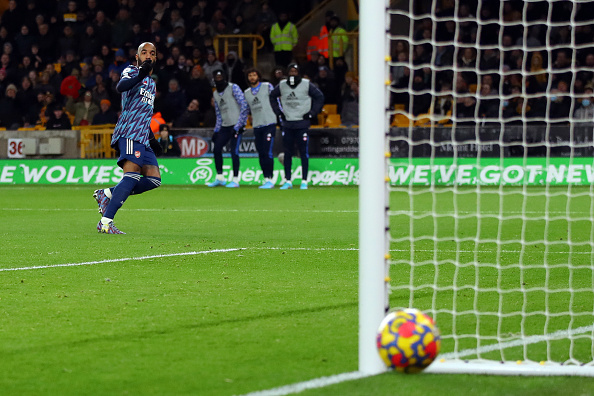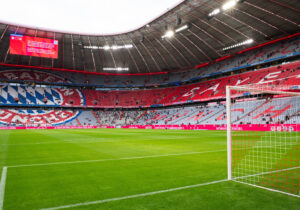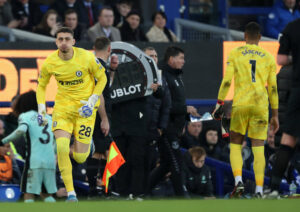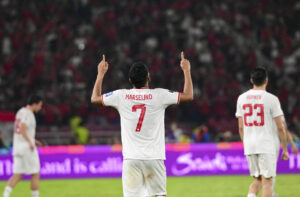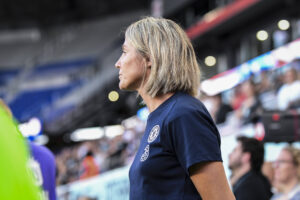For Arsenal fans of a certain age, the dream was always to marry a George Graham defence with an Arsène Wenger attack. A team that could somehow combine the legendary back five (including goalkeeper David Seaman) of Graham’s best sides with the irresistible attack of Wenger’s best teams would surely have been unbeatable. The problem for Arsenal at the moment is that just as they finally seem to be building a defence worthy of comparison with Graham’s best backlines, they are losing the attacking threat, and particularly the goal-scoring power, not just of Wenger’s best forward lines but of any forward line at all.
As the Arsenal Defence Improves, Their Attack Continues to Falter
Arsenal’s Defensive Problems Are Finally Easing
It is surely undeniable now that after nearly two decades (so, since Sol Campbell left the club in 2006), Arsenal finally have a defence worthy of the name. The archetypal backs-to-the-wall performance against Wolves at Molineux, when they held out for nearly half an hour (including injury time) after Gabriel Martinelli had been sent off, without even conceding a real chance let alone a goal would have delighted the likes of Adams, Bould and Keown. And of course it wasn’t a one-off, as it was a near-replica of the defensive display at Anfield in the first leg of the Carabao Cup, when the Gunners also kept a clean sheet despite having to play for nearly an hour with one less man after Granit Xhaka had been sent off.
Mikel Arteta deserves great credit for this. Not only has he brought in new defensive players, in particular the best goalkeeper-central defender axis (Aaron Ramsdale and Ben White) since the long-ago days of Seaman and Adams, but he has obviously been drilling them relentlessly, à la Graham, on the training pitch, such that they can remain fully focused and resolute, even when facing a team with an extra player.
The new first-choice back five of Ramsdale, Tomiyasu, White, Gabriel and Tierney obviously has a long way to go before it can match the historic achievements of George Graham’s back five, but it is also by far the best collective defensive unit that Arsenal have had in more than a decade and a half. That is evident even when one of those back five has to be replaced, as Tomiyasu was by Cedric Soares at Molineux, because there is little if any drop-off in overall defensive solidity.
The Arsenal Problem is in Attack
Benjamin Franklin famously said that the only two certainties in life are death and taxes, but he was wrong, because taxes can be avoided (and increasingly are). The second certainty in life is not taxes but problems. Usually, even if you solve one problem, another one emerges, and that is absolutely the case for Arsenal right now, because just as Arteta appears to be easing the club’s long-standing defensive woes, there is a real fear that the Gunners are losing much of their attacking – more precisely, goal-scoring – ability.
The real problem with the departure of Pierre-Emerick Aubameyang was not letting him go but failing to replace him. It is arguable that even if Aubameyang had somehow stayed at Arsenal, the club would still have needed an extra striker. They have struggled to score goals all season and the departure of the once-great Gabonese has only accentuated that.
Right now, Arsenal’s central “strike force”, if it can be called that, consists solely of Alexandre Lacazette and Eddie Nketiah, or, as they have been cruelly (but perhaps not unfairly) dubbed, “Lackofthreat and Notyetiah”. The reason that Aubameyang was signed in the first place was because Lacazette has never been a prolific goal-scorer, neither at Lyon nor Arsenal, and there are real doubts that the 22-year-old Nketiah will ever be the 20-goal-a-season striker that Aubameyang was in his pomp and that every team challenging for honours (or at least a Champions League place) needs. To date, Nketiah has barely scored 20 goals in his entire career, let alone a single season, and the vast majority of those have come playing for England U21s rather than at club level.
It is surely hoping too much that, as Arteta has protested, Lacazette and Nketiah can collectively get the goals that Arsenal will need if they are seriously to challenge for a top four finish in the Premier League. He has also talked about using a “false nine” in attack, but the one time that he tried that tactic, in the first leg of the Europa League semi-final against Villarreal last season, it was a complete disaster. In addition, it is arguable that rather than having false nines of the kind that Manchester City, Arteta’s previous club, have in abundance, Arsenal only have fake nines in Lacazette and Nketiah.
Is Playing Martinelli Centrally the Answer?
It had been thought that a possible solution to Arsenal’s striking crisis was to play Gabriel Martinelli as the centre-forward. However, the implementation of that plan will have to be shelved for at least one game, following the Brazilian’s sending-off against Wolves and subsequent ban. Moreover, based on his career so far, not only for Arsenal but for Brazil, with whom he won the Olympic Gold last summer, it seems likely that he prefers playing on the left wing rather than up front, preferring to cut inside a full-back to shoot at goal rather than playing for the majority of the game with his back to goal. In that respect at least, he is the natural successor to Aubameyang.
One other possible solution to what many Arsenal fans fear will become a goal-scoring crisis, especially at the end of the season when the Gunners will not only play Manchester United and West Ham but will almost certainly have rearranged games against Spurs, Chelsea and Liverpool, is the recall of Folarin Balogun from his loan spell at Middlesbrough. However, that is not only unlikely because the usual terms of any loan deal would preclude it but because it would mean Arteta admitting that he had failed to foresee Arsenal’s attacking problems when he agreed to the loan in the first place. And if there is one thing we have learned about Arteta by now, it is that he rarely admits to getting things wrong.
So, it seems likely that Arsenal will have to see out the rest of the season with the two central strikers they have, hoping that the team’s other attackers – Martinelli, Bukayo Saka, Martin Ødegaard and Emile Smith Rowe – can make up for any shortfall in goals.
Fortunately, Defence is More Important Than Attack
If there is one crumb of consolation that Arsenal fans can cling on to, it is that the team’s vastly improved defence might just see them over the line to Champions League qualification, or at the very least to a return to the Europa League by finishing fifth or sixth. The cliché, not just in football but in other sports (notably American football), is that “offence (or attack) wins games, defence wins titles”, and as with most clichés there is at least a grain of truth in it. That can be seen by comparing the wildly contrasting fortunes of the France 1998 World Cup-winning side and the great but fatally flawed Brazil side that spectacularly failed to win the World Cup in 1982.
It is often forgotten that the centre-forward for France ’98, before Henry, Anelka and Trezeguet had fully matured, was the fairly abject Stéphane Guivarc’h. But a backline of Desailly, Thuram, Lizarazu and Blanc (with Frank Leboeuf replacing the suspended Blanc for the Final) was enough to secure global triumph, whereas all the attacking riches of Brazil 82 – Zico, Socrates, Falcao, Eder, Cerezo et al – were not enough to win the tournament because Brazil’s backline and goalkeeper were so poor.
Arsenal fans will hope that the same is true for them, namely that a solid defence can be the basis for a sustained Champions League challenge, offsetting the obvious deficiencies of an attack that, without Aubameyang or any replacement for him, looks unlikely to score many goals. Only time will tell whether their hopes will be rewarded.
Main Photo
Embed from Getty Images


